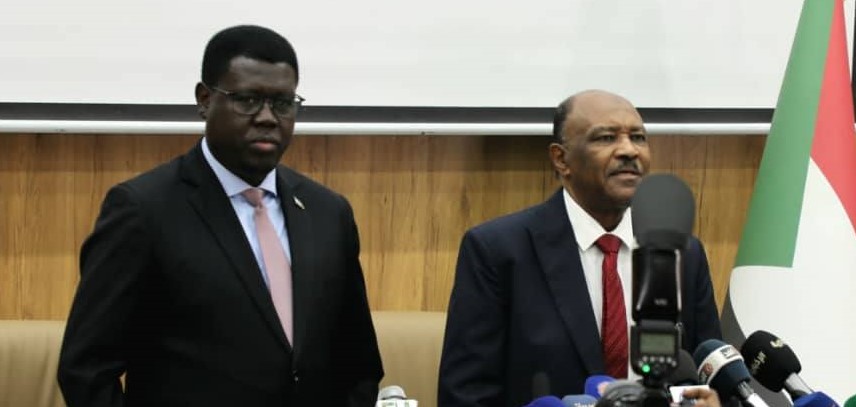The foreign ministers of Sudan and South Sudan pledged to revitalize long-dormant cooperation agreements and strengthen ties on critical economic and security issues, according to a joint communiqué issued at the end of a high-level visit to Sudan by South Sudan’s top diplomat.
The detailed communiqué, released on Monday after two days of talks in Port Sudan, outlines a roadmap for collaboration as both nations confront internal conflicts and economic instability.
South Sudanese Foreign Minister Monday Semaya met with his Sudanese counterpart, Mohiddin Salim Ahmed, and other senior officials, delivering a message of solidarity from President Salva Kiir to Gen. Abdel-Fattah Burhan, the head of Sudan’s ruling Sovereign Council.
The core outcome of the visit was a commitment to reactivate a network of joint committees that had stalled in recent years. The foreign ministers agreed to immediately revitalize existing political and security mechanisms to oversee the new initiatives.
Key areas of agreement detailed in the communiqué include plans to form a joint economic committee to enhance trade, investment, and infrastructure. The two sides will study establishing a dedicated free trade zone for South Sudan at Port Sudan to facilitate the transit of oil and other goods.
In a critical move for both economies, the two sides agreed to exchange technical expertise, coordinate field visits, and strengthen consultations to boost oil production and secure pipeline infrastructure.
South Sudan, which is landlocked, depends entirely on Sudan’s pipelines to export its crude oil, making their cooperation a strategic necessity.
On security, the ministers pledged to improve oversight of cross-border movement and address residency issues for their citizens. Following a meeting with the head of Sudan’s General Intelligence Service, both parties emphasized the need for their security agencies to coordinate more closely to counter mutual threats.
The communiqué also highlighted an intention to harmonize their positions in regional and international forums, specifically to promote peace and development in the Horn of Africa.
To maintain the diplomatic momentum, both governments agreed to a series of follow-up visits. Sudan’s ministers of foreign affairs, oil, and interior are scheduled to travel to Juba, while South Sudan plans to send its vice president in charge of the economic cluster and its minister of trade and industry to Port Sudan. Semaya also formally invited Sudan’s Prime Minister, Kamal Idris, to visit South Sudan.
During his meeting with Idris, who was joined by Sudan’s oil and interior ministers, the Sudanese leader praised the “fraternal and historical relations” between the two countries, according to a Sudanese government statement.
Analysts viewed the visit and the resulting communiqué as a significant step, driven by necessity.
“This is a diplomatically substantial engagement, particularly given the severe internal pressures both governments are facing,” said Sudanese political analyst Hatim Ayoub Abu El Hassan.
“The oil file remains the core of both economic strain and interdependence. These talks appear to be an effort to address long-standing friction points and create a more predictable framework for cooperation,” he added.
Sudan has been engulfed in a devastating civil war since April 2023, when fighting erupted between the military and paramilitary forces. South Sudan, while implementing a fragile peace agreement of its own, continues to grapple with political uncertainty, economic crisis, and localized violence.
At the conclusion of the visit, Minister Semaya expressed gratitude for Sudan’s hospitality and reiterated his country’s commitment to the partnership.
“I extend deep appreciation to the government and people of Sudan for the warm reception,” he said.




